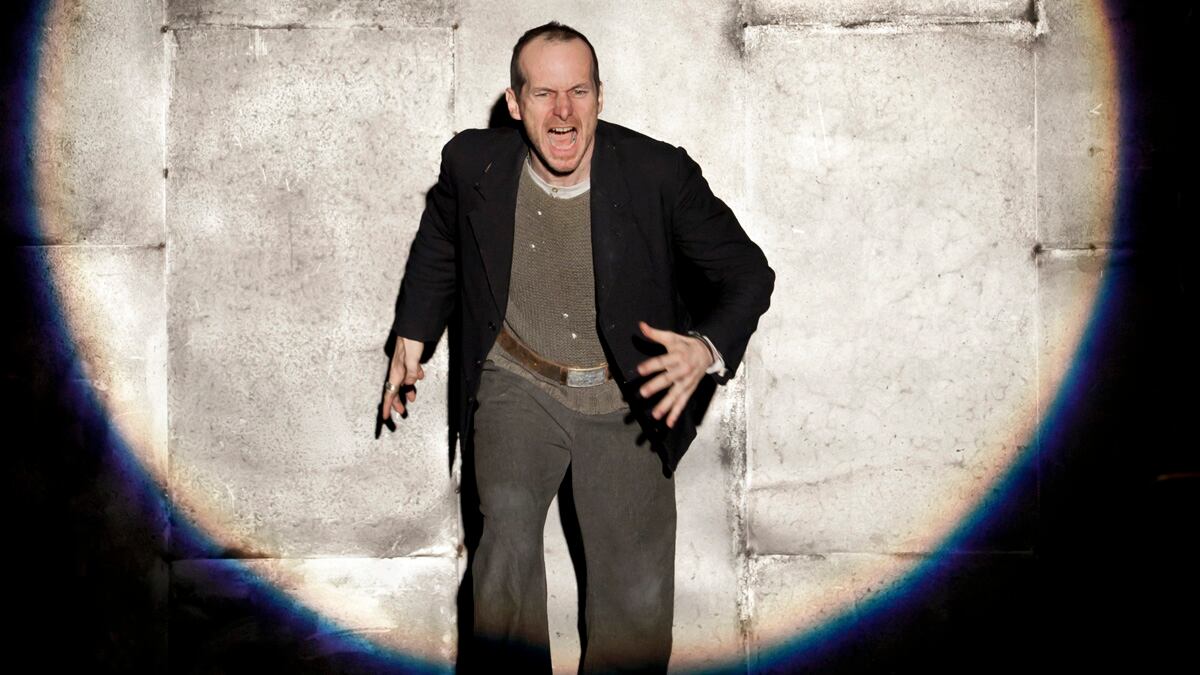Ask actor Denis O’Hare how he’ll spread the word that his one-man show “An Iliad,” is must-see theater, and he shrugs. “Sexier posters?” he asks. Along with co-author and director Lisa Peterson, O’Hare has taken Robert Fagles’s translation as the basis for a complete re-invention of the Greek classic. The result is a tour de force that has already sold out its off-Broadway run. O’Hare, known for his starring roles on TV in True Blood and American Horror Story alternates performances with the equally extraordinary Stephen Spinella. “Friends coming to see it always ask me if they need to read something first,” O’Hare says. “I say, ‘No, we take care of that. Don’t worry about it. We’ll fill you in.’”
Why take one of the great epic sagas of all time that features massive battles and fleets of ships and turn it into a one-man play?
This is a work of art that’s been around. Long before Homer wrote it down—if there was a Homer—it had been in existence for awhile, told and re-told. For all the import and message of “The Iliad,” it’s ultimately a story that’s meant to be heard, and the person hearing “The Iliad” determines what it means. Our original impulse was to write our version and then walk into a bar and see if we could get anyone to listen to us. Or stand under a bridge or in a coffee shop. Our narrator, the Poet, enters a room and starts talking. It can be any room. Think back to bardic tradition and storytelling tradition, and that’s all it ever it was. One-on-one entertainment.
How do you connect with a modern audience—many of whom have never read the original?

We were shy early on, feeling that we weren’t profound enough or artistic enough to compare ourselves to Homer. Our guiding ethos was we’re not trying to better Homer, we’re not trying to explain Homer, we’re not being condescending—we’re trying to make a shortcut to people’s emotions, to short-circuit their brains and go right to their gut. Homer uses metaphor—‘it was so crowded, it was like bees swarming over a pail of milk.’ We found contemporary metaphors that would have the same directness. We compare the frustration of war to waiting in the line in the supermarket and the other line is moving faster but you won’t switch or you’ve wasted your time. The audience becomes like kids again, being told—sit back and imagine this! It’s a level of storytelling that keeps people enthralled. My favorite comment was from a teenage girl who said, “I had to cover my eyes during the killing scenes.”
I can understand. You’re on stage with almost no props, and yet I trembled when you describe a sword being plunged....
Achilles stabs Hector in the throat. Brad Pitt did get that right, by the way [in the movie Troy]. He did get that right.
You stand on a table at one point and recite all the wars from ancient Babylon to present-day Syria. It’s a long list. Is the point obvious?
The Poet, or Homer, is telling the story. He’s condemned, like Sisyphus, to a task, and his task is to tell the story until it no longer becomes necessary. He says at the beginning, “Every time I sing the song, I hope it’s the last time.” What would that be for him? He told the story in Napoleon’s time, he told the story in Charlemagne’s time, he told the story in Genghis Khan’s time. He was telling the story to different audiences and he is not in control of the reaction, just like we are not. What lessons are they drawing from this piece? Alexander the Great fashioned himself after Achilles and very much identified with him. Caesar read this work and reflected on it during his campaigns.
The Poet says it was a big hit in Gaul.
Exactly! All we can do is ask the question and every audience member will come away with a different answer. Maybe they will conclude that war is an evil which must be stopped, or maybe war is inherent to human nature and it will never go away.
Surely there’s a message you wanted to send.
We started this back in 2005 when Lisa was looking for a way to reflect on the wars in Iraq and Afghanistan, and she felt contemporary playwrights weren’t responding. Somebody had once told her that the first play was “The Iliad,” even though it’s not really a play. She asked me if I wanted to read it with her and turn it into a one-man show. I said absolutely. We read and reflected and improvised. Lisa’s not a political person, she doesn’t look for a platform to promote her ideas. My motivation is more clear-cut. I’m completely antiwar, and I find it horrifying that in this culture I’m now a minority voice. “The Iliad” is about a war 1,200 years ago that solved nothing and achieved nothing. Most of our wars achieve very little. But whatever agenda I have gets buried in a work this great. If you’re being honest, you realize that as an artist, you’re not a policy maker.
There’s a tension in “The Iliad” because the deaths are gruesome and people die in rage and agony. But the poem also celebrates the heroic values of war. How did you deal with that duality?
Homer totally has it both ways. There’s a great chapter when Patroclus goes on his rampage and he’s killing everybody, and Homer does this incredible thing where he gives a backstory, in one or two sentences, to every person being killed. As the spear is entering a man’s head, he’ll say he was just married and left behind a 2-year-old son. Or he was a great warrior from the fields of Argos, and he was a good potter, known to produce beautiful things. He values each life as it’s ended. I don’t know what Homer’s point was, but he did it.
The original is 15,000 lines of poetry. How do you capture it in 100 minutes?
We tried to stay with a very strict core, which is Achilles and Hector. What do we need to know them? What’s salient to that story? By condensing it, we focus people’s minds on some important themes. We amplified the scene with Agamemnon to let people understand that Achilles is not acting out of pettiness. Agamemnon is saying to Achilles—you have to buckle under to my will because I’m more powerful than you are. It’s humiliating. All Achilles has is his sense of glory. We also tried to beef up that Hector has a wife and child. There’s a beautiful section where Hector walks in with his helmet still on and the baby starts crying. The image of a father saying to his child “don’t be afraid of me” seemed so powerful.
On fathers and sons, the scene of King Priam begging for Hector’s body is extraordinary.
We can’t take credit for Homer’s brilliance. Priam the King humbles himself by risking everything, coming in by himself under cover of night. He thinks they’ll kill him and he’s surprised they don’t. He begs for his son’s body back and Achilles agrees. Two extraordinary things happen in that scene. One is that Achilles is moved enough to say “Yes, I’ll do this.” And also Achilles is smart enough that when Priam yells at him, he says “Don’t yell at me, because if you do, I’ll get mad at you and if I get mad at you, I might kill you, so calm down.”
Homer’s recitation of the ships can be tedious. But you do a wonderful job turning it on its head so it says to the audience—this is about you.
That was our first foray into metaphor. We looked at the list of ships, and we thought, It’s so long, what’s the point of this? And then we realized it’s Homer’s way of saying, these are individual people. This town sent 50 people and this place sent 10,000, but they all came together in this cause. Can you imagine being in Homer’s audience and being a Greek, and hearing him name your town? You’d shout, “Yeah! Boisha!” It’s the pride of being included, kind of like a rock-and-roll singer strumming, “Hello, Cleveland!” It’s reaching out to say to the audience “I know you.” So we made it the boys from Nebraska and South Dakota, from the Panhandle and Okeehobee. I guarantee you there’s someone in the audience who says “Wow, he just named Lawrence, Kansas! How random is that?” It’s a way of shortcutting intellect and going right to the viscera.
In the midst of all this, you’re also shooting the coming season of HBO’s True Blood. Your head must be spinning.
The only way to do it is to focus on one thing at a time. All I can think about is tonight’s performance. I can’t consider that I’m going to fly at 6 in the morning and land in L.A. and go to the set and shoot a scene. The positive side is that doing different projects puts the other in relief and gives you a different perspective. It’s like reading two books at the same time. Ever done that? They play off each other in a nice way.






